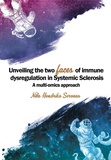Unveiling the two faces of immune dysregulation in Systemic Sclerosis
Summary
Background and aims of this thesis:
Systemic sclerosis (SSc) is a complex, heterogeneous autoimmune disease characterized by vascular abnormalities, immune involvement and extensive fibrosis of the skin and internal organs. Immune system dysregulation is recognized as one of the main culprits of SSc pathogenesis, however, it remains unclear what molecular mechanisms underlie this. By applying various high-throughput omics approaches, the studies presented in this thesis aim to uncover the molecular mechanisms contributing to immune cell dysregulation in SSc.
Factors driving innate immune cell dysregulation in SSc:
In chapter 2, we performed transcriptomic profiling of monocytes from healthy individuals and SSc patients to identify lncRNAs involved in the regulation of toll-like receptor (TLR) induced pro-inflammatory responses in these cells. We found the lncRNA NRIR (Negative Regulator of the IFN Response) to be upregulated in SSc as compared to healthy monocytes. Characterization of NRIR function by siRNA mediated knockdown showed that this lncRNA is involved in the positive regulation of interferon (IFN) inducible genes. Notably, we also found NRIR to be upregulated in publicly available RNA-sequencing data set of monocytes from systemic lupus erythematosus (SLE) patients, which, like SSc, are also characterized by the presence IFN signature. These results indicate a role for NRIR in controlling IFN responses in monocytes from SSc patients, and potentially other autoimmune diseases.
In chapter 3, the lncRNA profile of SSc monocytes was investigated in more detail. Here we show that lncRNAs are also implicated in regulation of other pathways important for monocyte biology, including monocyte apoptosis and cytokine secretion. We identified the lncRNA PSMB8-AS1 as a potential regulator of immune related pathways in SSc monocytes. siRNA mediated knockdown of PSMB8-AS1 reduced the secretion of the cytokines IL-6, TNFα and IL-8 by stimulated monocytes, further highlighting lncRNAs as novel molecular factors contributing to monocyte dysregulation in SSc.
In chapter 4, we investigated the epigenomic landscape of monocytes from fifteen healthy controls and sixty patients with SSc, SLE or rheumatoid arthritis (RA). Whereas SSc and SLE monocytes were marked by a strong dysregulation of IFN and TNFα signaling pathways, RA monocytes lacked the IFN signature and were highly enriched for TNFα, TGFβ, and collagen formation pathways. The dysregulation of these disease specific pathways was already imprinted at the histone level, showing that aberrances in histone marks selectively skew SSc, SLE and RA monocytes towards distinct pro-inflammatory phenotypes. We also identified numerous bivalent promoters, of which many displayed increased levels of H3K4me3 in RA and eaSSc, and to a limited extent dcSSc monocytes. Interestingly, a large number of bivalent domains were identified in promoters of genes related to response to fibroblast growth factors, ECM organization, and vasculogenesis.
In chapter 5, we identified the nuclear receptor 4A subfamily (NR4A1, NR4A2, NR4A3), as important transcriptional repressors of inflammation in conventional dendritic cells (cDCs) from SSc patients. Characterization of the genome-wide binding sites of NR4As in resting and stimulated cDCs by ChIP-sequencing showed that NR4As are strongly involved in transcriptional programs underlying cDC dysregulation in SSc. Indeed, functional experiments using agonists targeting NR4As showed that these receptors are involved cytokine production and modulation of T cells activation by cDCs. Thus, NR4As are important negative regulators of immune pathways in cDCs, and NR4A downregulation potentially contributes to the dysregulation of these cells in SSc patients.
Skewing of the adaptive immune system in SSc
In the second part of this thesis, the dynamics of the T cell repertoire in SSc were studied to better understand the role of antigen specific T cell responses in SSc pathogenesis. In chapter 6, we show that the TCR repertoire in SSc patients is highly persistent over time, which is likely driven by antigenic selection. Moreover, we identified clusters of TCRs with similar specificities in SSc patients over time, representing groups of T cells that are likely to recognize the same or highly similar antigens.
To determine to what extent the longitudinal persistence of circulating T cells are characteristic of SSc, in chapter 7 we studied the immune cell architecture and TCR repertoire dynamics of peripheral blood and affected joints of juvenile idiopathic arthritis (JIA) patients. Whereas in SSc patients T cells from peripheral blood were highly clonally expanded, only T cells obtained from affected joints from JIA patients exhibited an expanded profile while circulating T cells did not. These results indicate that tissue specific dominant (auto-)antigens in JIA patients heavily skew the TCR repertoire, while in SSc, the potential antigens might be more ubiquitously expressed. Additionally, JIA patients were characterized by a strong expansion and persistence of regulatory T cells (Tregs) rather than effector T cells, whereas in SSc, effector CD4+ and CD8+ T cells were highly expanded over time.
Concluding remarks:
Altogether, the work presented in this thesis shows that immune dysregulation in SSc can be attributed to aberrances at various levels of molecular organization. These include the regulation of TLR signaling by lncRNAs, epigenomic imprinting of histone modifications and downregulation of immune regulatory transcription factors in monocytes and DCs. Enhanced activation of these innate immune cells has the potential to cue the adaptive immune system and orchestrate the generation of highly clonal autoreactive T cell repertoire. These inights offer new avenues for the development of novel therapeutics for SSc as well as other autoimmune diseases.
